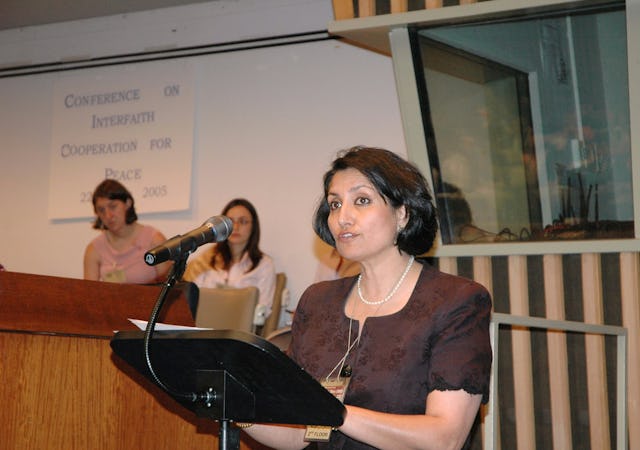Unity stressed at interfaith conference
UNITED NATIONS, United States — The key to interfaith harmony is to focus on the essential oneness of all religions, a Baha'i International Community representative told a groundbreaking conference on interfaith cooperation.
"It is this essential unity of religion, across the tremendous diversity of history, culture, tradition, philosophy, and practice, that should now become the operating principle of religious discourse," said the Community's principal representative to the United Nations, Bani Dugal.
Ms. Dugal was among some two dozen speakers at the "Conference on Interfaith Cooperation for Peace," which was held on 22 June 2005.
The conference was sponsored by a tripartite group that included 16 governments, three UN agencies, and eight religious and civil society organizations.
It is the first time such a group has convened a substantive interfaith event at the United Nations -- an institution that rarely holds interfaith gatherings of any type.
A report of the conference will be communicated to world leaders at the planned Millennium Summit Plus Five conference in September.
Secretary of Foreign Affairs of the Philippines Alberto G. Romulo, who opened the conference, said his government chose to co-sponsor the event because of the "vital role" that religions have in the promotion of peace.
"Religions lie at the heart of each culture and civilization," said Dr. Romulo. "We embark on this tripartite partnership as an historic and inspired approach to the collective pursuit of universal peace as a fundamental goal enshrined in the UN Charter and in the 2000 Millennium Declaration."
In her address, Ms. Dugal said persistent religious intolerance requires "a fundamental change in the way that believers of different religions relate to one another."
"The remedy for the repeated crises plaguing our communities today is to center our efforts and frank deliberations on that which we hold in common rather than that which sets us apart," Ms. Dugal said.
Growing numbers of people are already coming to realize that the truth underlying all religions is, in its essence, one, she said.
"This recognition arises not through a resolution of theological disputes but through an awareness of the reality that there is only one human family and that the Divine Essence, from which all life has sprung, has also been the impulse behind the principles and laws of the great religions of the world.
"The diversity of regulations and observances associated with the various faiths need not pose a challenge to the idea of religion's essential oneness. That religions differ from one another is to be attributed to the different requirements of the age in which they appeared."
Ms. Dugal told the conference that the Baha'i sacred writings offer numerous passages stating the purpose of religion 'is to establish unity and concord amongst the peoples of the world.'"
She also urged governments everywhere to observe the right, outlined in the Universal Declaration of Human Rights, for individuals to freely adopt and change their religious beliefs.
"The individual's search for truth is an activity intimately linked with the human conscience and with the essence of life itself," Ms. Dugal said.
"At a time when religious extremism, intolerance, and discrimination are threatening peace in many parts of the world, religious leaders must unequivocally support, if not lead, efforts to ensure that all people are afforded this fundamental freedom," she said.
Ms. Dugal called for women and girls to be involved alongside men and boys in laying the foundation for interfaith understanding and sustainable peace.
Full participation of women should be "passionately pursued, not only at the level of pragmatism but as the expression of the spiritual and moral principle that men and women are equal in the sight of God."
Other speakers included Jean Ping, President of the UN General Assembly; Rapil Zhoshybaev, Deputy Minister of Foreign Affairs, Kazakhstan; Katherine Marshall, Director and Counselor to the President of the World Bank; Dr. H.M. Din Syamsuddin, Vice-Chairman of Muhammadiyah (Indonesia); Laurence Bropleh, Permanent Representative to the UN, World Council of Churches; Maleeha Lodhi, High Commissioner for Pakistan in London; Ambassador Gunter Mulack, Commissioner for Dialogue with the Islamic World (Germany); and William Vendley, General Secretary, World Conference of Religions for Peace.
Government co-sponsors of the event were: Argentina, Bangladesh, Ecuador, Gambia, Germany, Indonesia, Iran, Kazakhstan, Malaysia, Morocco, Pakistan, Philippines, Senegal, Spain, Thailand, and Tunisia.
UN agency co-sponsors were: the Department of Economic and Social Affairs; the United Nations Educational, Scientific, and Cultural Organization (UNESCO), and the World Bank.
Civil Society Organization co-sponsors were: the Baha'i International Community, the Committee of Religious NGOs at the United Nations, the International Public Policy Institute, Soka Gakkai International, Temple of Understanding, United Methodist Church, United Religions Initiative, and World Peace Prayer Society.
